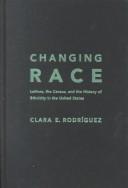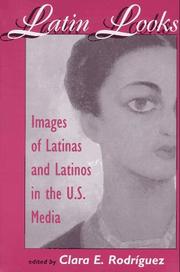| Listing 1 - 10 of 13 | << page >> |
Sort by
|

ISBN: 0044970420 Year: 1989 Publisher: London : Unwin Hyman,
Abstract | Keywords | Export | Availability | Bookmark
 Loading...
Loading...Choose an application
- Reference Manager
- EndNote
- RefWorks (Direct export to RefWorks)
Puerto Ricans --- Economic conditions. --- Social conditions. --- Economic conditions --- Social conditions --- United States --- Race relations

ISBN: 0814775470 0814745083 0814771963 Year: 2000 Publisher: New York (N.Y.): New York University press
Abstract | Keywords | Export | Availability | Bookmark
 Loading...
Loading...Choose an application
- Reference Manager
- EndNote
- RefWorks (Direct export to RefWorks)
Latinos are the fastest growing population group in the United States.Through their language and popular music Latinos are making their mark on American culture as never before. As the United States becomes Latinized, how will Latinos fit into America's divided racial landscape and how will they define their own racial and ethnic identity? Through strikingly original historical analysis, extensive personal interviews and a careful examination of census data, Clara E. Rodriguez shows that Latino identity is surprisingly fluid, situation-dependent, and constantly changing. She illustrates ho
Categorization (Psychology) --- Ethnology --- Hispanic Americans --- Race --- Hispanics (United States) --- Latino Americans --- Latinos (United States) --- Latinxs --- Spanish Americans in the United States --- Spanish-speaking people (United States) --- Spanish-surnamed people (United States) --- Latin Americans --- Spanish Americans (Latin America) --- Classification (Psychology) --- Abstraction --- Physical anthropology --- Ethnic identity --- Race identity --- Social aspects --- United States --- Race relations. --- Race question --- Race - Social aspects - United States.
Book
ISBN: 1479861510 1479856827 1479818526 9781479818525 9781479856824 Year: 2018 Publisher: New York : New York University Press,
Abstract | Keywords | Export | Availability | Bookmark
 Loading...
Loading...Choose an application
- Reference Manager
- EndNote
- RefWorks (Direct export to RefWorks)
The surprising effects of American TV on global viewers As a dominant cultural export, American television is often the first exposure to American ideals and the English language for many people throughout the world. Yet, American television is flawed, and, it represents race, class, and gender in ways that many find unfair and unrealistic. What happens, then, when people who grew up on American television decide to come to the United States? What do they expect to find, and what do they actually find? In America, As Seen on TV, Clara E. Rodríguez surveys international college students and foreign nationals working or living in the US to examine the impact of American television on their views of the US and on their expectations of life in the United States. She finds that many were surprised to learn that America is racially and economically diverse, and that it is not the easy-breezy, happy endings culture portrayed in the media, but a work culture. The author also surveys US-millennials about their consumption of US TV and finds that both groups share the sense that American TV does not accurately reflect racial/ethnic relations in the US as they have experienced them. However, the groups differ on how much they think US TV has influenced their views on sex, smoking and drinking. America, As Seen on TV explores the surprising effects of TV on global viewers and the realities they and US millennials actually experience in the US.The surprising effects of American TV on global viewers As a dominant cultural export, American television is often the first exposure to American ideals and the English language for many people throughout the world. Yet, American television is flawed, and, it represents race, class, and gender in ways that many find unfair and unrealistic. What happens, then, when people who grew up on American television decide to come to the United States? What do they expect to find, and what do they actually find? In America, As Seen on TV, Clara E. Rodríguez surveys international college students and foreign nationals working or living in the US to examine the impact of American television on their views of the US and on their expectations of life in the United States. She finds that many were surprised to learn that America is racially and economically diverse, and that it is not the easy-breezy, happy endings culture portrayed in the media, but a work culture. The author also surveys US-millennials about their consumption of US TV and finds that both groups share the sense that American TV does not accurately reflect racial/ethnic relations in the US as they have experienced them. However, the groups differ on how much they think US TV has influenced their views on sex, smoking and drinking. America, As Seen on TV explores the surprising effects of TV on global viewers and the realities they and US millennials actually experience in the US.
Television programs --- Television viewers --- Immigrants --- Television broadcasting --- Telecasting --- Television --- Television industry --- Broadcasting --- Mass media --- Emigrants --- Foreign-born population --- Foreign population --- Foreigners --- Migrants --- Persons --- Aliens --- Audiences, Television --- Television audiences --- Television fans --- Television watchers --- Viewers, Television --- Programs, Television --- Shows, Television --- Television shows --- TV shows --- Electronic program guides (Television) --- Television scripts --- Influence. --- Sociological aspects. --- Audiences --- Television broadcasting - United States - Influence --- Immigrants - United States - Sociological aspects --- Television viewers - Sociological aspects --- Television programs - United States - Influence

ISBN: 0813327652 0813327660 Year: 1997 Publisher: Boulder, Colo. : Westview Press,
Abstract | Keywords | Export | Availability | Bookmark
 Loading...
Loading...Choose an application
- Reference Manager
- EndNote
- RefWorks (Direct export to RefWorks)
Book
ISBN: 0367316595 0429978952 0429499329 0786742275 1429491345 9780786742271 Year: 2008 Publisher: New York Westview Press
Abstract | Keywords | Export | Availability | Bookmark
 Loading...
Loading...Choose an application
- Reference Manager
- EndNote
- RefWorks (Direct export to RefWorks)
"Collection of essays provides a sustained critique of stereotypical images and representations of Puerto Ricans and other Latinos in US film, television, and printed media. Authors of individual chapters are experts in media and/or performance studies. Contributes to a better understanding of Latino cultural experiences in US society"--Handbook of Latin American Studies, v. 58.
Book
ISBN: 0429303602 1000236900 9780429303609 9781000236903 9781000308785 1000308782 9781000272840 1000272842 Year: 2019 Publisher: London Routledge
Abstract | Keywords | Export | Availability | Bookmark
 Loading...
Loading...Choose an application
- Reference Manager
- EndNote
- RefWorks (Direct export to RefWorks)
Puerto Ricans --- Social conditions. --- Economic conditions. --- United States --- Race relations.
Book
ISBN: 9780814771969 Year: 2000 Publisher: New York, NY
Abstract | Keywords | Export | Availability | Bookmark
 Loading...
Loading...Choose an application
- Reference Manager
- EndNote
- RefWorks (Direct export to RefWorks)
Book
ISBN: 9781479861514 1479861510 1479856827 9781479856824 9781479818525 1479818526 9781479856824 Year: 2018 Publisher: New York : New York University Press,
Abstract | Keywords | Export | Availability | Bookmark
 Loading...
Loading...Choose an application
- Reference Manager
- EndNote
- RefWorks (Direct export to RefWorks)
The surprising effects of American TV on global viewers As a dominant cultural export, American television is often the first exposure to American ideals and the English language for many people throughout the world. Yet, American television is flawed, and, it represents race, class, and gender in ways that many find unfair and unrealistic. What happens, then, when people who grew up on American television decide to come to the United States? What do they expect to find, and what do they actually find? In America, As Seen on TV, Clara E. Rodríguez surveys international college students and foreign nationals working or living in the US to examine the impact of American television on their views of the US and on their expectations of life in the United States. She finds that many were surprised to learn that America is racially and economically diverse, and that it is not the easy-breezy, happy endings culture portrayed in the media, but a work culture. The author also surveys US-millennials about their consumption of US TV and finds that both groups share the sense that American TV does not accurately reflect racial/ethnic relations in the US as they have experienced them. However, the groups differ on how much they think US TV has influenced their views on sex, smoking and drinking. America, As Seen on TV explores the surprising effects of TV on global viewers and the realities they and US millennials actually experience in the US.The surprising effects of American TV on global viewers As a dominant cultural export, American television is often the first exposure to American ideals and the English language for many people throughout the world. Yet, American television is flawed, and, it represents race, class, and gender in ways that many find unfair and unrealistic. What happens, then, when people who grew up on American television decide to come to the United States? What do they expect to find, and what do they actually find? In America, As Seen on TV, Clara E. Rodríguez surveys international college students and foreign nationals working or living in the US to examine the impact of American television on their views of the US and on their expectations of life in the United States. She finds that many were surprised to learn that America is racially and economically diverse, and that it is not the easy-breezy, happy endings culture portrayed in the media, but a work culture. The author also surveys US-millennials about their consumption of US TV and finds that both groups share the sense that American TV does not accurately reflect racial/ethnic relations in the US as they have experienced them. However, the groups differ on how much they think US TV has influenced their views on sex, smoking and drinking. America, As Seen on TV explores the surprising effects of TV on global viewers and the realities they and US millennials actually experience in the US.
Television programs --- Television viewers --- Immigrants --- Television broadcasting --- Influence. --- Sociological aspects.
Digital
ISBN: 9780814771969 Year: 2000 Publisher: New York, N.Y. New York University Press
Abstract | Keywords | Export | Availability | Bookmark
 Loading...
Loading...Choose an application
- Reference Manager
- EndNote
- RefWorks (Direct export to RefWorks)
Multi
ISBN: 9781479861514 Year: 2018 Publisher: New York, N.Y. New York University Press
Abstract | Keywords | Export | Availability | Bookmark
 Loading...
Loading...Choose an application
- Reference Manager
- EndNote
- RefWorks (Direct export to RefWorks)
| Listing 1 - 10 of 13 | << page >> |
Sort by
|

 Search
Search Feedback
Feedback About UniCat
About UniCat  Help
Help News
News